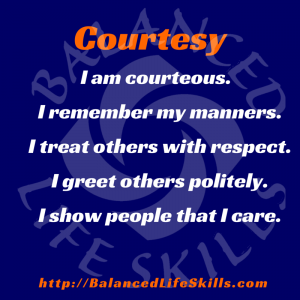 Have you noticed how individuals tone and inflections of voice change when they are in the presence of a person that they respect or are in awe of for reason of their power or position? Yet those same individuals who can be so deferential , can also be harsh and discourteous to those that they feel more powerful than, or greater than in some manner. This can be evident in the home.
Have you noticed how individuals tone and inflections of voice change when they are in the presence of a person that they respect or are in awe of for reason of their power or position? Yet those same individuals who can be so deferential , can also be harsh and discourteous to those that they feel more powerful than, or greater than in some manner. This can be evident in the home.
Courtesy can easily be lost with the perception of power or feeling greater than another person. If power does not get us, then some lose their ability to be courteous when they feel wronged or disrespected. How impressed are we when we meet an individual who has fame, power, and notoriety and still maintains a spirit of courtesy?
I have known individuals who were well known and respected in their field and yet they took the time to remember the name of others and would speak to them as an equal – no matter how young or what their position in life was. Their courteous nature was an example to follow.
For some being courteous comes very naturally and others need to be reminded from time to time. Practice courtesy at home with your children in little and big ways. Being sure that as a parent we use the common words of please and thank you with the children and our partners. Being willing to say that we are sorry when we hurt another person and taking responsibility for the action is a good example for everyone watching us and our practice for the outside world.
Our children learn from us, how we treat each other, them and even how we treat/talk about our parents – no matter their age. Children learn by observing how we adults deal with, talk about and feel about employers or employees, teachers and government officials. Our courtesy balanced with assertiveness, tact and friendliness will set an example for our children.
Balanced Life Skills is bringing out the best in our children and ourselves.




